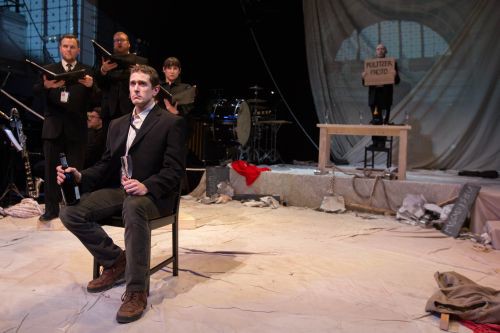 United States Jonathon Berger, Visitations: “Theotokia” and “The War Reporter”: Soloists, Christopher Rountree (music director). Roulette, Brooklyn, NY, 11.1.2014. (DS)
United States Jonathon Berger, Visitations: “Theotokia” and “The War Reporter”: Soloists, Christopher Rountree (music director). Roulette, Brooklyn, NY, 11.1.2014. (DS)
Production:
Composer: Jonathon Berger
Librettist: Dan O’Brien
Music Director: Christopher Rountree
Director: Rinde Eckert
Performance:
Melissa Hughes (soprano)
New York Polyphony
JACK Quartet
Stephen Gosling (piano)
Tara O’Connor (flute)
Pascal Archer (clarinet)
David Cossin (percussion)
Doug Balliett (contrabass)
Where can you find a schizophrenic patient, a nun, ColumbiaUniversity honoraries, bibles, a war photographer with PTSD, and a Yeti costume all in one place? In opera, of course! Composed by Jonathan Berger with libretto by Dan O’Brien, Visitations (in its New York premiere) brings together two short productions examining the deeper struggles of hallucinations—that which is reality induced and that which may simply, but as powerfully, come from within.
As part of the second annual Prototype Festival (a ten-day flurry of hot musical theater and opera), the Brooklyn downtown venue Roulette presented “Theotokia” and “The War Reporter.” Both works are ingeniously staged to use the same dramatically draped white backdrop—reminiscent of an apartment in the midst of re-painting. The power of the characters, the simple props (a tin potty or bright red rags, for example) and the structures of each story transform the surroundings from lock-down schizophrenia ward in “Theotokia” to arid but war-torn Mogadishu in “The War Reporter.”
Both works were performed by the same group of five singers, Melissa Hughes (soprano) along with the male quartet, New York Polyphony. Much like the white drapery, they allowed each story to jerk them into place and demand their powers to dig into the deeper crevices of each work. Geoffrey Williams (countertenor) as the schizophrenic patient—mangled in his shredded white straight jacket—sang with a piercing high-pitched exactness infused, nevertheless, with a barbarous sense of hysteria mixed in with a touch of longing. The potty was his, as it turned out. And he dug into it without abandon (an instinctual, primordial act by those who’ve lost their mental faculties) during the aria, “Dung!” Feces was never so exquisitely and so engagingly sung about.
In “The War Reporter,” Christopher Herbert (baritone) plays Paul Watson, the real-life Pulitzer Prize-winning photojournalist, who is haunted by the ghost of the dead American soldier whose photo he snaps as it is dragged indifferently through the streets of Mogadishu. Herbert gives a charged performance (most convincing in his dashing tinted Ray-Ban’s) that travels between moods of strict personal severity to those of extreme vulnerability, fishing into a lake of guilt that endlessly drags him down. The audience, I’m sure, held onto every syllable in the distressing aria he offers to his therapist (Hughes) about his own father’s experience as a soldier—both an acknowledgement of Herbert’s talent but also the librettist’s succinctly simple, yet jarring, story-within-a-story verse.
Back to the Yeti costume: Hughes dons the large furry patchwork overcoat in “Theotokia” becoming the patient’s “yeti mother” (your guess is as good as mine) who sings of snowy Himalayan heights. Despite being full of nonsensical events, Hughes’ unabashed theatrical abandon carries us through the opera on a wild ride that nevertheless brings everything together in one holistic experience. And to her expressive credit, she transforms a seemingly innocent lavender vest in which to pray demonically over her schizophrenic son’s condition more frighteningly than the monstrous furry amalgam preceding it.
On stage, veritably in the action, JACK Quartet and a handful of chamber orchestral musicians under the direction of Christopher Rountree wove together the words into their rightful places. Electronic sounds and visuals also made their way onto the stage, adding essential grating qualities, like the sounds of a camera shutter clicking aggressively and the shimmering images of bubbling DNA activity flying across the drapery. The production paid as close attention to the music and words as it did to the staging of the singers themselves. From composer to lighting designer, everyone played a crucial part in realizing an artistic message, powerful in delivery and penetrating in meaning.
Daniele Sahr
